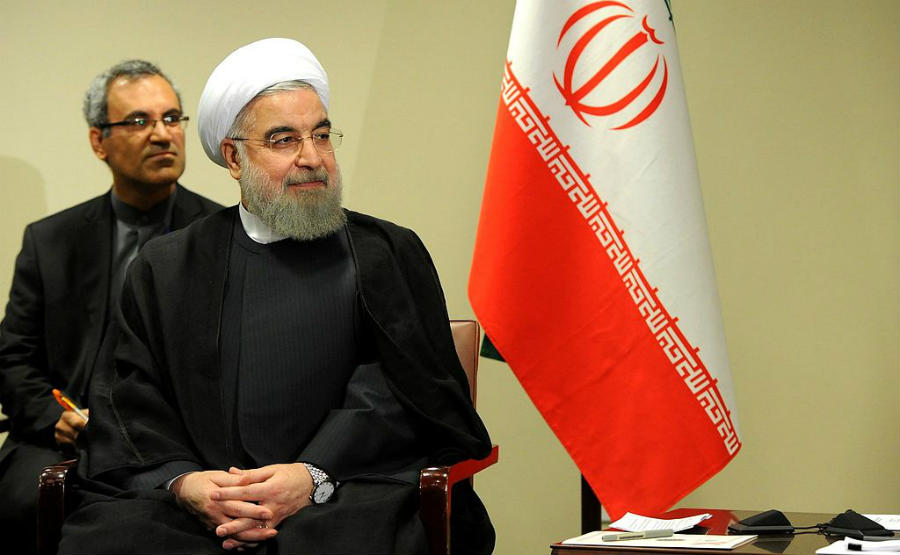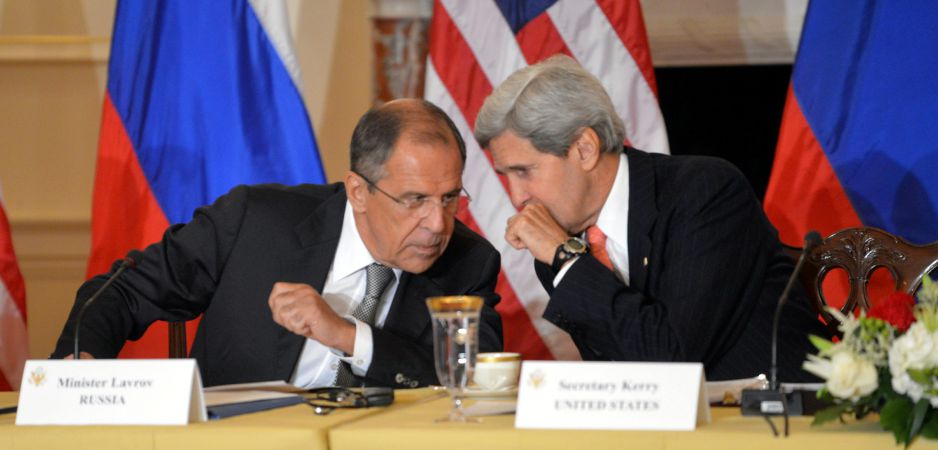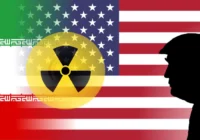The Kingdom of Saudi Arabia hopes that the execution of Sheikh al-Nimr will reignite a sectarian war with Iran and jeopardize the nuclear deal.
This year could have been a turning point for the Middle East. Prospects of peace were exceptionally hopeful at the end of 2015, with a United Nations-brokered ceasefire in Yemen, renewal of negotiations on Syria, and a historical nuclear deal struck between Iran and the international community.
Unfortunately, Saudi Arabia marked the beginning of 2016 with mass executions, including the beheading of a prominent Saudi Shia cleric, Sheikh Nimr al-Nimr. Saudi authorities detained Nimr in the midst of the Arab Spring, after he rocked the Shia community in the country’s Eastern Province with his powerful sermons calling for their empowerment and an end to autocratic rule. He was a thorn in Saudi Arabia’s side for stirring unrest among the marginalized. Consequently, he was executed on January 2, along with 46 other prisoners, most of whom were members of al-Qaeda.
Nimr was not a terrorist. On the contrary, he reached notoriety for his sermons that eschewed violence and espoused a tone of peace, while still encouraging Shias to demand for political rights. Nimr served as a symbolic leader for the Shias, which is why his death sparked protests throughout the world—from the Middle East to South Asia and even Europe. The most notable of these protests took place in Tehran, where enraged Iranians stormed and firebombed the Saudi Embassy, which provided Riyadh with a long-awaited excuse to end diplomatic ties with the Islamic Republic.
It is no secret that the Kingdom of Saudi Arabia vehemently opposes the recent rapprochement between Iran and the United States as a result of the nuclear deal. The agreement not only undermines Riyadh’s hegemonic role in the Middle East, but also weakens its relationship with Washington, especially as its oil reserves declines and the US becomes increasingly energy-independent.
Nimr’s execution was a calculated decision by Riyadh. King Salman bin Abdulaziz al-Saud hopes to reawaken sectarian strife between the two regional powerhouses, and prove to its Western allies that Iran cannot be trusted. However, what may have been a calculated decision by Saudi Arabia could have catastrophic consequences if Iran does not play its cards rights. On the other hand, if it does, it could also serve as a critical opportunity for Tehran to prove its role as a regional leader.
A Calculated Decision
King Salman’s decision to execute Nimr demonstrates his perseverance in reversing the power trajectory of Saudi Arabia. Under his predecessor, King Abdullah bin Abdulaziz al-Saud, the kingdom took a turn for the worse. Saudi Arabia, in the past, had been able to use its wealth to force other states to submit to its demands. However, it is now losing clout, which renders it as an ineffectual regional power and Western ally. It failed to prevent the rise of Houthi rebels in Yemen and overthrow the Assad regime in Syria. Instead, it has not only played a role in escalating both crises, but has lost immense legitimacy among the rest of the Arab world as a result.
Saudi influence in the Middle East is waning. Under pressure of this new reality, King Salman sought to flex his muscles and make a statement with the execution of Nimr that Saudi Arabia will continue to be a leader of the Arab and Muslim world. This, however, would require bringing down its top nemesis: Iran.
The nuclear deal between the international community and the Islamic Republic has driven a wedge between Saudi Arabia and the US. Despite fierce Saudi opposition to the deal, the Joint Comprehensive Plan of Action was adopted in 2015 and will largely take effect early this year. In exchange for Iran curbing uranium enrichment, the international community has promised to lift crippling economic sanctions. The opening of its economy will undoubtedly help the country to prosper, especially as it reenters the oil market. Iran contains the fourth largest crude oil reserves, and the second largest natural gas reserves in the world.
However, Iran’s new-found wealth could also translate into more regional power, which Saudi Arabia resents. Similarly, as Iran slowly integrates into the international community, it will become increasingly evident that it is a reliable partner and less of an adversary. Considering that the nuclear deal is still in its early phases of implementation, Riyadh likely feels a sense of urgency to take action now before it becomes too late. By executing Nimr, it hopes to elicit a retaliatory response from Tehran that could lead to the reenactment of economic sanctions on the Islamic Republic, and ultimately a reversal of the progress made from the nuclear deal.
Riyadh’s conscious move to reignite sectarian strife in the Persian Gulf is also a calculated decision by King Salman to harden his image as a merciless leader, as well as amass government support among his citizenry. His actions suggest that he hopes to compensate for the House of Saud’s decline under King Abdullah’s rule by exerting ruthless aggression toward his adversaries.
Before the execution of the Shia cleric, it was Salman who ordered the formation of an international coalition to fight Houthi rebels in Yemen. The Houthis, a Shia political movement, had seized the capital Sanaa and overthrown the government toward the end of 2014.
At first, the Houthis only intended to hold onto power until it was guaranteed they would be represented in the future government, since Shias in the small Arab state have been politically marginalized throughout history. By March 2015, however, the Yemenis were close to a political solution when Saudi Arabia launched a war against the Houthis.
Riyadh feared that a power-sharing government in Yemen could set a precedence in not only its own country, but also its protectorates like Bahrain, which suffered a severe Shia uprising during the Arab Spring against its Sunni monarchy. The message King Salman sought to send was clear: Saudi Arabia would not tolerate the rise of Shias, who Riyadh—along with radical Islamist groups like the Islamic State—believes are heretics of Islam. The recent execution of Nimr echoed that same message.
Salman hopes his firm stance against Shias in the region will make him a leader among Sunnis who share his resentment toward them. However, Nimr’s death was also intended to rally support among Saudis, many of whom had grown frustrated with the monarchy in recent weeks. Salman can no longer afford the concessions that King Abdullah had made to Saudi nationals in order to buy their support for the monarchy. His predecessor bought loyalty in the midst of the Arab Spring by announcing a $130 billion economic package that he spent on thousands of new jobs, greater housing loans and increased salaries. The kingdom had since retained generous subsidies for the public, including fuel, water and electricity among other resources.
As Editor-in-Chief Atul Singh points out in The World This Week at Fair Observer, it was only days before Nimr’s execution when the Saudis were forced to cut these subsidies in order to mitigate the kingdom’s budget deficit.
It was not long before King Salman discovered that his country’s historical policy of buying loyalty with its oil revenues was no longer sustainable. While it felt that it was pertinent to keep the price of oil low in order to compete with Iran, Saudi Arabia can no longer afford to buy government support from its people. Instead, Salman used the threat of a Shia uprising in the Persian Gulf and possible retaliation from Iran for the execution of Nimr to garner support among his majority Sunni population. The mass support he received for the execution suggests it may be working—at least for now.
Consequences
Saudi Arabia’s calculated decision to execute Sheikh al-Nimr could, however, have adverse effects. The greatest threat is the potential impact it could have on the prospects of peace in Syria and Yemen.
Saudi Arabia’s hawkish behavior is merely a power play to reclaim what it believes is its rightful regional hegemony. The execution of Sheikh al-Nimr is intended to ignite sectarian tensions between Saudi Arabia and Iran, and adversely jeopardize the nuclear deal.
The Saudi-led coalition has already announced that it will no longer observe the ceasefire in Yemen that was established on December 15, 2015, at the start of the UN-brokered peace talks in Switzerland. The talks are slated to pick up on January 14. However, if Saudi Arabia continues to show disinterest in a political solution and expand its ruthless air campaign, as it has been doing, and if Iran bolsters support for the Houthis, the peace process could not only be stalled, but the crisis could escalate to new heights.
Yemen has become a stage for a proxy war between the two powerhouses, and it could worsen as a result of the new tension created by Nimr’s execution.
Around 6,000 civilians are estimated to have been killed in the conflict, with over a million internally displaced according to the World Health Organization. Al-Qaeda in the Arabian Peninsula (AQAP) and the Islamic State have already taken advantage of the power vacuum, further complicating the prospects of a political solution and an end to the conflict.
Recent events could also significantly hinder the Syrian peace process. Both Saudi Arabia and Iran serve as instrumental players in the Vienna Talks, which is the international roundtable discussion on the Syrian conflict. It was Riyadh that managed to put together a delegation of members from different Syrian opposition groups to attend the next round of negotiations. Similarly, Iran is the closest link to the Assad regime, and it could use its leverage over the government to force concessions. If either country refuses to attend future talks, or if they use Syria to further the proxy war, like Yemen, the prospects for peace could be severely limited.
The greatest consequence that could come from Nimr’s execution is one that would encompass Yemen, Syria and more: a sectarian Cold War in the Middle East. While Saudi Arabia would try to corral the Sunni Arab world, Iran would elicit the support of Shia Muslims around the region. Proxy wars like those in Yemen and Syria would be exacerbated, and tensions would undoubtedly ignite new conflicts in other divided nations such as Iraq, Lebanon and Bahrain, to name a few.
This would not only further destabilize the Middle East, but also draw in Western countries and potentially create an actual Cold War-esque confrontation between the US and Russia over rivaling spheres of influences. The outcome would be catastrophic. Although Saudi Arabia may be hoping to ignite some level of sectarian strife to force Iran to lapse from its progress, Nimr’s death has the potential to spark something far more egregious. It all rests on the Islamic Republic.
A Way Out
Saudi Arabia’s hawkish behavior is merely a power play to reclaim what it believes is its rightful regional hegemony. The execution of Sheikh al-Nimr is intended to ignite sectarian tensions between Saudi Arabia and Iran, and adversely jeopardize the nuclear deal.
Although top political leaders in Iran have already condemned Riyadh’s actions, and even promised revenge, Tehran’s most effective course of action is no action. It can continue to deliver fiery rhetoric in order to appease its own public, but it is imperative for the stability of the region that it does not actually carry out its threats. Retaliation by Iran or vis–à–vis one of its proxies would force the international community to rethink the nuclear deal and reverse the decades of work it took to reach this monumental agreement.
Iran can prove to the world that it can serve the role as a regional leader by acting out of the best interest for the Middle East, and not reciprocating Saudi Arabia’s belligerent behavior. Not only would this improve Iran’s reputation to the international community, but also tarnish Saudi Arabia’s. This would force the US and other Western allies to reevaluate their relationship with Riyadh.
King Salman’s desperate attempt to salvage Saudi Arabia by reigniting a sectarian war will be a fruitless effort if Iran does not fall into its trap. The Islamic Republic must find the perfect balance between satisfying public opinion at home and abroad. This was the exact struggle it faced during the nuclear negotiations. Iran won that battle and it can do it again.
The views expressed in this article are the author’s own and do not necessarily reflect Fair Observer’s editorial policy.
Photo Credit: US State Department / Kremlin
 We bring you perspectives from around the world. Help us to inform and educate. Your donation is tax-deductible. Join over 400 people to become a donor or you could choose to be a sponsor.
We bring you perspectives from around the world. Help us to inform and educate. Your donation is tax-deductible. Join over 400 people to become a donor or you could choose to be a sponsor.
Support Fair Observer
We rely on your support for our independence, diversity and quality.
For more than 10 years, Fair Observer has been free, fair and independent. No billionaire owns us, no advertisers control us. We are a reader-supported nonprofit. Unlike many other publications, we keep our content free for readers regardless of where they live or whether they can afford to pay. We have no paywalls and no ads.
In the post-truth era of fake news, echo chambers and filter bubbles, we publish a plurality of perspectives from around the world. Anyone can publish with us, but everyone goes through a rigorous editorial process. So, you get fact-checked, well-reasoned content instead of noise.
We publish 2,500+ voices from 90+ countries. We also conduct education and training programs
on subjects ranging from digital media and journalism to writing and critical thinking. This
doesn’t come cheap. Servers, editors, trainers and web developers cost
money.
Please consider supporting us on a regular basis as a recurring donor or a
sustaining member.
Will you support FO’s journalism?
We rely on your support for our independence, diversity and quality.








